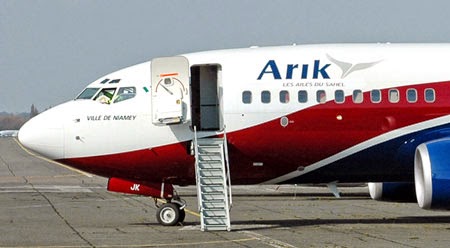Attempts to engage AMCON and Arik Air have yielded limited results. In a 2017 email from Arik’s Human Resources department, the airline acknowledged the grievances but cited its financial challenges as a barrier to addressing pre-receivership debts.
BY ANTHONY OMOH
In 2017, the Asset Management Corporation of Nigeria (AMCON) assumed control of Arik Air, in an effort to prevent its financial collapse. While this intervention is still ongoing, it left a trail of unresolved grievances, particularly for 39 expatriates who played crucial roles in the airline’s operations. These expatriates, many of whom held senior positions such as vice presidents, captains, co-pilots, and cabin crew, have endured years of financial hardship due to over $1,618,550.65 and £282,905 unpaid entitlements.
The expatriates claim their contracts were abruptly terminated by AMCON on March 17, 2017, without prior notice or compensation, violating the terms of their employment agreements. Many of them had already faced salary delays or outright non-payment in the months leading up to the takeover, leaving them financially vulnerable. The termination letter issued by AMCON’s representative, Ijeoma Ike-Okereke, Associate Vice President of Human Resources, failed to address outstanding salaries for September 2016 through March 2017, feeding allowances, and the required three-month notice period payments stipulated in their contracts.
One expatriate detailed how AMCON’s refusal to authorize payments aggravated the situation. “Statements detailing the amounts owed to us were provided to AMCON, but they deliberately declined to authorize the payments. This wasn’t a mistake; it was a calculated decision,” the expatriate said in an email. The lack of communication from AMCON has further deepened their frustration, as they feel abandoned after years of dedicated service to the airline.
Legal Struggles and Unfulfilled Promises
Initially, the expatriates sought legal redress through a consolidated claim spearheaded by their lawyer, Essien Aquaisua. Contracts and relevant documents were submitted, forming the basis for a class action seeking compensation for their unpaid entitlements. However, progress has been excruciatingly slow, with Essien citing bureaucratic delays and a lack of responsiveness from AMCON. The expatriates were repeatedly assured that their claims were included on a “list of creditors,” yet no payments have been made to date.
Essien later advised against taking the case to court and has been pursuing the matter since 2017 and the prolonged delay has only fueled frustration.
Further complicating matters, Essien recently suggested abandoning the collective class action in favor of individual lawsuits. He argued that the specific terms of their contracts with Arik Air Limited necessitated separate legal approaches. This proposal has left the expatriates divided, with many questioning whether fragmenting their efforts would weaken their case and prolong an already exhausting battle.
Adding to their anxiety is the looming threat of Nigeria’s statute of limitations, which could render their claims legally void if not acted upon in time. While Essien has reassured them that their case remains valid, the expatriates remain deeply concerned as the eight-year mark approaches.
Emotional and Professional Toll
The financial distress caused by these unpaid salaries is only one aspect of the expatriates’ ordeal. Many of them have suffered damage to their professional reputations, as prospective employers question the circumstances surrounding their abrupt departures from Arik Air. The psychological toll of prolonged uncertainty, coupled with the inability to access funds they worked hard to earn, has left lasting scars. Some expatriates have been forced to dip into personal savings, take on debt, or even sell assets to make ends meet, a situation they describe as humiliating and deeply unjust.
“This is not just about money; it’s about fairness, dignity, and accountability,” said another expatriate who requested anonymity. “We dedicated years of our lives to this airline, only to be cast aside without so much as an apology or an explanation.”
AMCON and Arik Air’s Responses
Attempts to engage AMCON and Arik Air have yielded limited results. In a 2017 email from Arik’s Human Resources department, the airline acknowledged the grievances but cited its financial challenges as a barrier to addressing pre-receivership debts.
The email stated, “We are aware that outstanding sums are due to you. However, due to the company’s financial position, we are prioritizing payments to current staff. We will notify you when the company is able to address trade creditors.”
This response, however, provided no clear timeline or resolution, leaving the expatriates feeling increasingly marginalized. Arik Air in Receivership’s recent reaction to this matter when it was brought to their notice, “The receivership has been made aware of this indebtedness and are looking into it. They will be addressing this matter directly with the aggrieved parties AMCON’s receivership
A Call for Resolution
As the expatriates’ struggle enters its eighth year, their demands remain straightforward: payment of their over $1,618,550.65 and £282,905 unpaid salaries. unpaid salaries, notice period compensation, and feeding allowances as stipulated in their contracts. They are not asking for special treatment but simply for what they are rightfully owed. Their ordeal highlights the human cost of corporate mismanagement and the urgent need for mechanisms that safeguard employees during takeovers and receiverships.
For these expatriates, the hope of resolution is not just about financial recovery—it’s about restoring their dignity and ensuring accountability. As their patience wears thin, the onus is on AMCON, Arik Air, and other stakeholders to address this long-standing issue and bring an end to their prolonged suffering.

























